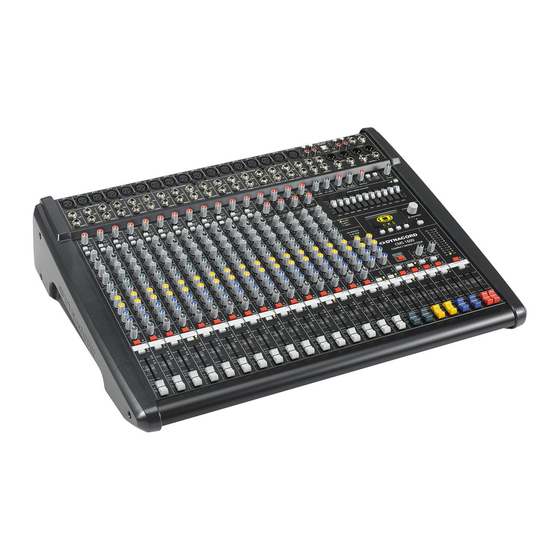Dynacord CMS 2200 Brosur & Spesifikasi - Halaman 4
Jelajahi secara online atau unduh pdf Brosur & Spesifikasi untuk Mixer Musik Dynacord CMS 2200. Dynacord CMS 2200 8 halaman. Compact mixing system

All 6 / 12 / 18 (respectively) mic inputs of the CMS 1000 / CMS 1600 / CMS 2200 are equipped with
XLR- (Mic) and jack (Line) sockets as well as a common Gain control with a range of 60 dB. This
makes it possible to introduce even line level signals through the XLR Mic inputs.
A channel break allows you to connect additional devices, such as compressors and gates, on a
channel-by-channel basis using the Insert sockets. A switchable Lo Cut filter permits the elimination
of low-frequency noise in the sub-80 Hz region. The 3-band tone controls section comprises a
semi-parametric equalizer with a sweepable Mid, the range of which is 100 Hz to 8 kHz. The Lo
shelving EQ has its 3 dB down point (corner frequency) at 60 Hz, whilst that of the Hi shelving EQ
is 12 kHz, the boost/cut being +/- 15 dB in each case. In all, four aux busses are provided to permit you
to ply the two internal effects devices with signals independently as well as two separately controllable
monitor busses. AUX 1 and AUX 2 control the level of the post-fader signal sent to the two internal
effects devices, FX 1 and FX 2. AUX 3 and AUX 4 are set pre-fader to allow the creation of independent
monitor mixes, but can be switched post-fader, if preferred, for the control of additional effects devices
in the sum.
All channels offer MUTE and PFL switches as well as level control meters with Signal Present and Peak
LEDs. Ultra high-quality ALPS faders control the Volume of the individual channels and are remarkable
for their extremely high attenuation values.
The four Mic / Stereo Line channels offer separate Mic Gain and Line Trim controls instead of the
Lo Cut and Vocal Voicing filter in the mono channels and offer a full dual-channel implementation.
Stereo signals from keyboards and samplers therefore take up no more than one of the available
channel strips each. The mixing of stereo line and microphone signals is also unproblematic.
In the master, all the control elements are laid out clearly in sections, in a configuration based
on practical experience. The Return level of the integrated effects devices (FX 1 and FX 2), the Send
level for AUX 3 and AUX 4, as well as the Stereo Master, are all implemented as faders. The 2 x 7-
band graphic equalizer can be switched instantly between the Master and AUX 3 + AUX 4.
Separate AUX 1 and AUX 2 Send controls allow the control of additional effects devices — parallel
to the internal effects or solo.
Systems for neighbouring rooms, side fills or even active sub-woofers can be driven via the separately
controllable Mono Out, which can be switched pre- or post-fader. There is a useful Standby switch for
programme pauses that does not affect the 2-track Return path, allowing material on tape or CD to be
routed to the master or else AUX 3 and AUX 4. All the XLR outputs are electronically balanced and
wired in such a way that operation via relay is not accompanied by clicks and pops.
